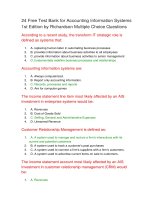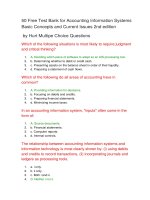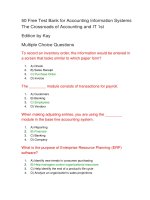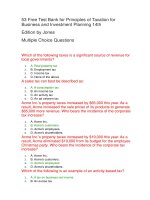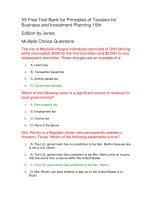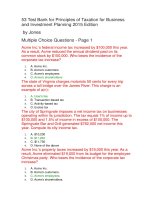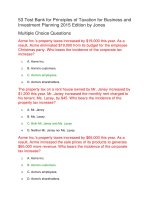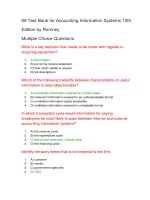53 test bank for principles of taxation for business and investment planning 2015 edition
Bạn đang xem bản rút gọn của tài liệu. Xem và tải ngay bản đầy đủ của tài liệu tại đây (42.65 KB, 10 trang )
53 Test Bank for Principles of Taxation for Business
and Investment Planning 2015 Edition
by Jones
Multiple Choice Questions - Page 1
Acme Inc.'s federal income tax increased by $100,000 this year.
As a result, Acme reduced the annual dividend paid on its
common stock by $100,000. Who bears the incidence of the
corporate tax increase?
1.
2.
3.
4.
A. Acme Inc.
B. Acme's customers
C. Acme's employees
D. Acme's shareholders
The state of Virginia charges motorists 50 cents for every trip
across a toll bridge over the James River. This charge is an
example of a(n):
1.
2.
3.
4.
A. User's fee
B. Transaction-based tax
C. Activity-based tax
D. Excise tax
The city of Springvale imposes a net income tax on businesses
operating within its jurisdiction. The tax equals 1% of income up to
$100,000 and 1.5% of income in excess of $100,000. The
Springvale Bar and Grill generated $782,000 net income this
year. Compute its city income tax.
1.
2.
3.
4.
A. $10,230
B. $11,230
C. $11,730
D. None of the above
Acme Inc.'s property taxes increased by $19,000 this year. As a
result, Acme eliminated $19,000 from its budget for the employee
Christmas party. Who bears the incidence of the corporate tax
increase?
1.
2.
3.
4.
A. Acme Inc.
B. Acme's customers.
C. Acme's employees.
D. Acme's shareholders.
Which of the following is an example of a transaction-based tax?
1.
2.
3.
4.
A. A tax on net business income
B. An excise tax
C. An estate tax on the transfer of assets at death
D. Both B. and C.
Government Q imposes a net income tax on businesses
operating within its jurisdiction. The tax equals 3% of income up to
$500,000 and 5% of income in excess of $500,000. Company K
generated $782,000 net income this year. Compute the income
tax that Company K owes to Q.
1.
2.
3.
4.
A. $29,100
B. $14,100
C. $39,100
D. None of the above
Acme Inc.'s property taxes increased by $65,000 this year. As a
result, Acme increased the sale prices of its products to generate
$65,000 more revenue. Who bears the incidence of the corporate
tax increase?
1.
2.
3.
4.
A. Acme Inc.
B. Acme's customers.
C. Acme's employees.
D. Acme's shareholders.
The incidence of a state sales tax levied on the purchase of retail
goods is:
1.
2.
3.
4.
A. Borne by the ultimate consumer of the goods.
B. Borne by the seller who must collect and remit the tax.
C. Borne by the manufacturer of the goods.
D. Borne by the government that levies the tax.
Which of the following statements concerning property taxes is
false?
1.
2.
3.
4.
A. Property taxes are ad valorem taxes.
B. Property taxes are the primary source of revenue for local governments.
C. Property taxes can be levied on realty or personalty.
D. None of the above is false.
A sales tax can best be described as a(n):
1.
2.
3.
A. Consumption tax
B. Income tax
C. Activity tax
4.
D. Ad valorem tax
Which of the following taxes is a significant source of revenue for
local governments?
1.
2.
3.
4.
A. Real property tax
B. Employment tax
C. Income tax
D. None of the above
The city of Mayfield charges individuals convicted of DWI (driving
while intoxicated) $500 for the first conviction and $2,000 for any
subsequent conviction. These charges are an example of a(n):
1.
2.
3.
4.
A. User's fee
B. Transaction-based tax
C. Activity-based tax
D. Government penalty
Which of the following is an example of an activity-based tax?
1.
2.
3.
4.
A. A tax on business' net income
B. An excise tax
C. A gift tax on the transfer of assets by gift
D. Both A. and C.
Mrs. King is a U.S. citizen who permanently resides in South
Africa. Which of the following statements is true?
1.
2.
A. The U.S. government has jurisdiction to tax Mrs. King.
B. The U.S. government has no jurisdiction to tax Mrs. King because she
does not live in the United States.
3. C. The U.S. government has no jurisdiction to tax Mrs. King because she
does not earn any income from a source within the United States.
4. D. Mrs. King can elect whether to pay tax to the United States or to South
Africa.
The property tax on a rent house owned by Mr. Janey increased
by $1,200 this year. Mr. Janey increased the monthly rent
charged to his tenant, Ms. Lacey, by $45. Who bears the
incidence of the property tax increase?
1.
2.
3.
4.
A. Mr. Janey
B. Ms. Lacey
C. Both Mr. Janey and Ms. Lacey
D. Neither Mr. Janey nor Ms. Lacey
Which of the following is an earmarked tax?
1.
A. A tax imposed on the purchase of specific items such as liquor or
cigarettes
2.
B. A tax that generates revenues that the government can spend only to
build more National Parks
3. C. A tax imposed only on individuals who earn more than $1 million
annually
4. D. A tax that generates revenues that the government can spend for any
purpose
Which of the following is not characteristic of a tax?
1.
2.
3.
4.
A. A tax is compulsory.
B. A tax is intended to punish unacceptable behavior.
C. A tax is levied by a government.
D. All of the above are characteristics of a tax.
Mrs. Renfru is a Brazilian citizen who permanently resides in
Houston, Texas. Which of the following statements is true?
1.
A. The U.S. government has no jurisdiction to tax Mrs. Renfru because she
is not a U.S. citizen.
2. B. The U.S. government has jurisdiction to tax Mrs. Renfru only on income
that she earns from a source within the United States.
3. C. The U.S. government has jurisdiction to tax Mrs. Renfru.
4. D. Mrs. Renfru can elect whether to pay tax to the United States or to
Brazil.
Mr. Dodd resides in a state with a 6% sales and use tax. He
recently traveled to another state to buy a sailboat and paid that
state's 4% sales tax. Which of the following statements is true?
1.
A. Mr. Dodd's use tax liability to his home state equals 2% of the purchase
price of the furniture.
2. B. Mr. Dodd does not owe a use tax to his home state.
3. C. Mr. Dodd's use tax liability to his home state equals 6% of the purchase
price of the furniture.
4. D. None of the above is true.
Mr. Smith resides in a state with a 6% sales and use tax. He
recently traveled to another state to buy furniture and paid that
state's 7% sales tax. Which of the following statements is true?
1.
A. Mr. Smith is entitled to a refund of 1% of the purchase price of the
sailboat.
2. B. Mr. Smith does not owe a use tax to his home state.
3. C. Mr. Smith's use tax liability to his home state equals 6% of the purchase
price of the sailboat.
4. D. None of the above is true.
Which of the following characterizes a good tax base?
1.
2.
A. The base can be easily expressed in monetary terms.
B. Taxpayers cannot easily avoid or conceal the base.
3.
4.
C. Taxpayers cannot easily move the base from one jurisdiction to another.
D. All of the above characterize a good tax base.
Which of the following taxes is not a significant source of revenue
for local governments?
1.
2.
3.
4.
A. Real property tax
B. Personal property tax
C. Employment tax
D. All of the above
Which of the following statements concerning sales taxes is
false?
1.
2.
3.
4.
A. Sales taxes apply to the purchase of most types of consumer goods.
B. Sales taxes apply to the purchase of most types of consumer services.
C. Sales taxes are collected by the seller when the sale is made.
D. Sales taxes imposed on the purchaser of retail items are consumption
taxes.
Which of the following statements regarding tax systems is false?
1.
A. A single percentage that applies to the entire tax base is described as a
flat rate.
2. B. When designing a tax, governments try to identify tax bases that
taxpayers can easily avoid or conceal.
3. C. A tax base is an item, occurrence, transaction, or activity with respect to
which a tax is levied.
4. D. With regard to tax systems, the term revenue refers to the total tax
collected by the government.
Mr. Bilboa is a citizen of Portugal. Which of the following
statements is true?
1.
A. The U.S. government has no jurisdiction to tax Mr. Bilboa because he is
not a U.S. citizen.
2. B. The U.S. government has jurisdiction to tax Mr. Bilboa if he is a
permanent resident of the United States.
3. C. The U.S. government has jurisdiction to tax Mr. Bilboa if he earns
income from a business he operates in Florida.
4. D. Both B. and C. are true.
53 Free Test Bank for Principles of Taxation for
Business and Investment Planning 2015 Edition by
Jones Multiple Choice Questions - Page 2
Which of the following does not characterize federal transfer
taxes?
1.
A. The tax is imposed on individuals but not on corporations.
2.
3.
4.
B. The tax is based on the value of property transferred by gift or at death.
C. The tax is a transaction tax.
D. All of the above characterize federal transfer taxes.
Which of the following statements about Treasury regulations is
false?
1.
A. Treasury regulations are written to interpret and explain the Internal
Revenue Code.
2. B. Treasury regulations are part of the statutory law.
3. C. A federal court can invalidate a Treasury regulation if the court concludes
that the regulation incorrectly interprets the Internal Revenue Code.
4. D. None of the above is false.
Which of the following is not considered administrative authority?
1.
2.
3.
4.
A. Treasury regulations
B. Revenue rulings
C. Tax Court decisions
D. All of the above are administrative authorities
When did the federal income tax become a permanent tax?
1.
2.
3.
A. Immediately after the Revolutionary War
B. During the Civil War
C. In 1913 when the Sixteenth Amendment to the U.S. Constitution was
ratified
4. D. In 1939 when Congress enacted the first Internal Revenue Code
Company N operates a mail order business out of its
headquarters in Tulsa, Oklahoma. This year, it mailed $892,000
worth of product to customers residing in Oklahoma and
$489,300 worth of product to customers residing in Missouri.
Which of the following statements is true?
1.
A. Company N must collect Oklahoma sales tax from its Oklahoma
customers and Missouri sales tax from its Missouri customers.
2. B. Company N must collect Oklahoma sales tax from both its Oklahoma
and Missouri customers.
3. C. Company N must collect Oklahoma sales tax from its Oklahoma
customers.
4. D. Company D is not required to collect sales tax on any mail order sales.
How often does Congress amend the Internal Revenue Code?
1.
2.
3.
4.
A. Rarely (the Internal Revenue Code has not been amended since 1986)
B. Occasionally (perhaps once every decade)
C. Regularly (at least once every five years)
D. Constantly (at least once a year)
Which of the following federal taxes is earmarked for a specific
purpose?
1.
2.
3.
4.
A. Corporate income tax
B. Employment taxes
C. Unemployment taxes
D. Both B. and C. are earmarked taxes.
Company D, which has its home office in Raleigh, North Carolina,
conducts business in the United States, Canada, and Mexico.
Which of the following statements is true?
1.
A. Because Company D must pay income tax to North Carolina, it is not
required to pay tax to any other state.
2. B. Because Company D must pay income tax to North Carolina, it is not
required to pay federal income tax.
3. C. Because Company D must pay income tax to the United States, it is not
required to pay tax to Canada or Mexico.
4. D. None of the above is true.
Which of the following statements about sales and use taxes is
true?
1.
A. If an individual pays a sales tax on the purchase of an item, she will not
have to pay a use tax on the purchase.
2. B. An individual must pay both a sales tax and a use tax on the taxable
purchase of an item.
3. C. Many states that impose a sales tax do not impose a complementary
use tax.
4. D. None of the above is true.
Which of the following is not characteristic of an excise tax?
1.
2.
3.
A. An excise tax is levied on the retail sale of specific goods.
B. Excise tax rates typically are higher than general sales tax rates.
C. Purchasers of luxury items are responsible for paying any excise tax
directly to the government.
4. D. All of the above are characteristics of an excise tax.
Which type of tax is not levied by the federal government?
1.
2.
3.
4.
A. Corporate income tax
B. Individual income tax
C. Employment taxes
D. General sales tax
Which tax raises the most revenue for the federal government?
1.
2.
A. Corporate income tax
B. Individual income tax
3.
4.
C. Excise taxes
D. Transfer taxes
Which of the following statements regarding the political process
of creating tax law is false?
1.
2.
3.
A. The political process contributes to the dynamic nature of the tax law.
B. Special interest groups have little effect on the tax legislative process.
C. When taxpayers device a new tactic for reducing their tax burdens,
governments respond by enacting a new rule to render the tactic ineffective.
4. D. Changes in political philosophy often reflect shifts in the public attitude
about the proper role of taxes in society.
Which of the following sources of tax law carries the most
authority?
1.
2.
3.
4.
A. Revenue procedure
B. Treasury regulation
C. Supreme Court decision
D. The three sources of tax law have equal authority
Which of the following is not an advantage of state conformity to
federal corporate income tax laws?
1.
2.
A. States have control over their corporate income tax revenues.
B. States do not have to enact comprehensive corporate income tax
statutes.
3. C. Conformity eases the compliance burden of corporate taxpayers.
4. D. All of the above are advantages of state conformity.
Which of the following sources of tax law carries the least
authority?
1.
2.
3.
4.
A. Revenue ruling
B. Treasury regulation
C. Section 736 of the Internal Revenue Code
D. The three sources of tax law have equal authority
Which of the following is/are not a primary source of authority for
the tax law?
1.
2.
3.
4.
A. A revenue ruling published by the Internal Revenue Service
B. Section 162 of the Internal Revenue Code
C. Treasury Reg. ยง 1.351-2
D. All of the above are primary sources of authority
Which of the following statements concerning judicial authority is
false?
1.
A. Appellate court decisions have more authority than trial court decisions.
2.
B. Supreme Court decisions have more authority than appellate court
decisions.
3. C. Supreme Court decisions are the equivalent of law.
4. D. None of the above statements is false.
Which of the following statements about the Internal Revenue
Code is false?
1.
2.
3.
4.
A. The Internal Revenue Code has not been amended since 1986.
B. The Internal Revenue Code is part of federal statutory law.
C. The Internal Revenue Code consists of numerically organized sections.
D. Only Congress has the authority to amend the Internal Revenue Code.
Which of the following taxes is a significant source of revenue for
state governments?
1.
2.
3.
4.
A. General sales tax
B. Individual income tax
C. Corporate income tax
D. All of the above
What is the major difference between a sales tax and an excise
tax?
1.
A. Sales taxes are levied by state governments, while excise taxes are
levied only by the federal government.
2. B. Sales taxes are imposed on the purchase of a wide variety of items,
while excise taxes are imposed on the purchase of a few specific items.
3. C. Sales taxes must be collected by the seller, while excise taxes must be
paid directly by the purchaser.
4. D. Sales taxes are imposed on the purchase of tangible goods, while excise
taxes are imposed on the purchase of services.
Which of the following does not characterize federal transfer
taxes?
1.
A. The tax is imposed on the value of wealth transferred by an individual as
a gift.
2. B. The tax is imposed on the value of wealth transferred because of the
death of an individual.
3. C. The tax is imposed on the value of wealth transferred by an individual to
charity.
4. D. All of the above characterize federal transfer taxes.
A revenue ruling is an example of:
1.
2.
3.
4.
A. Judicial authority
B. Administrative authority
C. Legislative authority
D. Editorial authority
Which of the following does not contribute to the dynamic nature
of the tax law?
1.
2.
3.
4.
A. The political pressure from professional lobbyists
B. Changes in the economic and social climate
C. Changes in revenue needs of the government
D. All of the above contribute to the dynamic nature of the tax law
SJF Inc., which has its corporate offices in Boise, Idaho, conducts
business in Idaho, Oregon, California, and British Columbia,
Canada. Which of the following statements is true?
1.
2.
A. SJF must pay income tax only to Idaho and the United States.
B. SJF may be required to pay income tax to Idaho, Oregon, California,
British Columbia, the United States, and Canada.
3. C. SJF must pay income tax only to Idaho, Oregon, California, and the
United States.
4. D. SJF may be required to pay income tax to either the United States or to
Canada, but not to both.
Revenue rulings and revenue procedures are written by:
1.
2.
3.
4.
A. The Internal Revenue Service
B. The Department of the Treasury
C. The United States Congress
D. The Supreme Court
Which of the following federal taxes is not earmarked for a
specific purpose?
1.
2.
3.
4.
A. Employment taxes
B. Unemployment taxes
C. Transfer taxes
D. All of the above are earmarked taxes.
What gives the federal government the right to impose a tax on
individual and corporate income?
1.
2.
3.
4.
A. Internal Revenue Code of 1986
B. Revenue Act of 1913
C. Sixteenth Amendment to the U.S. Constitution
D. Bill of Rights
